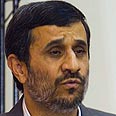
Nigeria will take actions against Iran if an investigation shows it violated international law and UN sanctions in an arms smuggling case, Nigeria's foreign minister said Friday.
The artillery rockets and other weapons, loaded in 13 shipping containers that were labeled as building supplies, were seized on Oct. 26 at a port in Lagos, Nigeria. Nigeria's security service believes the arms were imported by some local politicians to destabilize the country if they lose in upcoming elections that are expected to be hotly contested.
An international cargo shipper based in France has said one of its ships picked up the containers from Bandar Abbas, a port in southern Iran.
"The consignment did originate from Iran," Nigerian Foreign Minister Odein Ajumogobia told a news conference Friday "That has been confirmed from our own shipping documents and the Iranian authorities have also confirmed that the consignment did originate from Iran."
Underscoring the sensitivity of the matter, Iranian Foreign Minister Manouchehr Mottaki met with his Nigerian counterpart here late Thursday.
Ajumogobia said that as a result of his "very productive meeting" with Mottaki, the Iranian official authorized Nigerian officials to interview one of two Iranians implicated in the arms case. But Ajumogobia said the other man has diplomatic immunity.
Nigerian authorities believe both men are hiding in the Iranian Embassy, located down a quiet street in Abuja, the capital, and which is being watched by Nigerian security officials.
"If Nigeria finds at the conclusion of the investigation that there has been a breach of international law, a breach of U.N. sanctions, Nigeria is a member of the UN Security Council (and) we will do what is necessary," Ajumogobia told reporters.
In a 2007 resolution stepping up sanctions on Iran over its nuclear program, the UN Security Council banned Iranian arms exports, forbidding the sale or supply of weapons by Iran, whether directly or indirectly. It requires nations to prevent any such transfers and prevent their citizens from obtaining any weapons from Iran.
Mottaki's visit came after Nigerian authorities had concluded that Iran's government was behind the arms shipment, according to internal Nigerian government documents seen Thursday by The Associated Press.
'It doesn't cost anything'
T'he Nigerian foreign minister said Mottaki cleared the way for Nigerian security officials to interview Azimi Agajany, one of the men who Nigeria says organized the secret arms shipment through a Tehran-based company called International Trading and General Construction. Ajumogobia said Agajany may be questions as early as Friday.
The internal government reports seen by AP say Agajany received a visa to travel to Nigeria after getting an endorsement from Sheikh Ali Abbas Othman, also known as Abbas Jega, a Nigerian who worked for Radio Tehran's Hausa language service and studied in Iran. Jega is in the custody of Nigeria's State Security Service, a Nigerian government official told the AP.
The other Iranian implicated in the case, Sayed Akbar Tahmaesebi, entered Nigeria after Nigerian authorities received a letter of recommendation from Iran's foreign ministry saying he would "provide administrative support" at its Abuja embassy, according to the internal Nigerian reports.
Tahmaesebi has diplomatic immunity and cannot be questioned without Iran's consent, Ajumogobia said.
"If the Iranians are willing to waive immunity then we will pursue that, but in the meantime we are taking one step at a time," the Nigerian foreign minister told journalists.
Inside the cargo containers at Nigeria's main port in Lagos, inspectors found 107mm artillery rockets, rifle rounds and arms. The rockets can accurately hit targets more than 5 miles (8.5 kilometers) away with a 40-foot (12-meter) killing radius. Insurgents in Afghanistan and Iraq have used similar rockets against US troops. China, the United States, and Russia manufacture versions of the rocket, as does Iran.
Displaying a lack of knowledge about Nigeria's geography, Agajany initially wanted the consignments shipped to Abuja, the documents said. When Agajany was told there is no port in Abuja, which lies hundreds of miles (kilometers) from the coast, he came up with Lagos as the destination.
By shipping arms to the country, Iran may be attempting to "tweak" Western powers by showing it can influence affairs in a country vital to US oil supplies, said David Bender, a Washington-based analyst who studies Iran for the Eurasia Group.
"From their perspective, it doesn't cost anything," Bender said. "But it gives the impression that they are a global player."
Nigeria has a predominantly Muslim north and Christian south. Targeted killings allegedly committed by a radical Islamic sect have been shaking the north while militants have launched attacks in the oil-rich southern delta. Presidential elections are scheduled for next year in Africa's most populous country that embraced democracy only a decade ago after a string of military dictatorships and coups.
- Follow Ynetnews on Facebook















